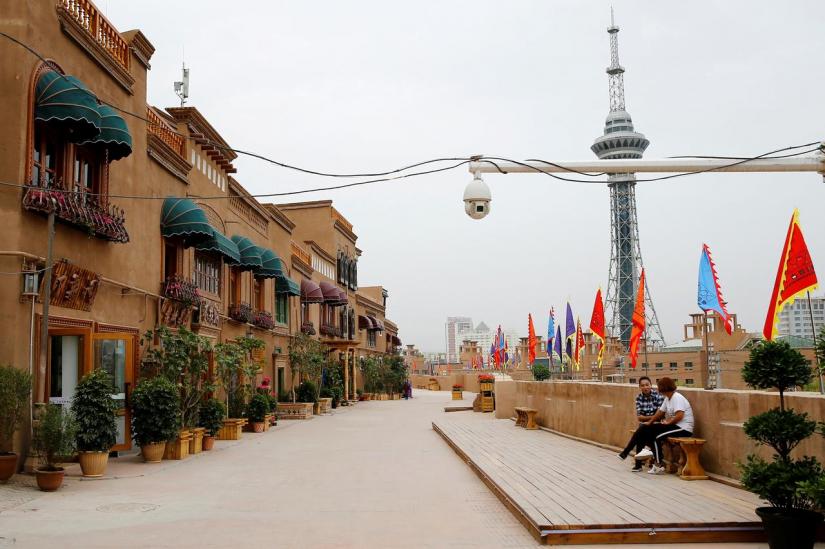 Chinese embassies all over the world invite trusted journalists to take them on a closely guarded guided tour of China.
Chinese embassies all over the world invite trusted journalists to take them on a closely guarded guided tour of China.
Most journalists after returning home wrote stories that categorically deny any wrong-doings of Chinese authorities in Tibet, especially regarding much-talked-about repression of Uighur Muslims – denying their freedom of movement, religious freedom and freedom of expression of 10 million ethnic Muslims.
China is in denial mode for detaining more than one million Uighurs in Xinjiang province in far north-west China in the so-called “re-education” centres inside high barbed-wire fences, complete with 24/7 guard towers for, months and years.
The recent publication of leaked documents in the New York Times sheds light on the internal mechanics of the Chinese Communist Party’s crackdown on Uighur Muslims.
The winds on the issue have changed. In high drama, the Capitol Hill in Washington DC passed a bipartisan bill, condemning the "gross human rights violations" against the Uighurs and calling for "an end to arbitrary detention, torture, and harassment of these communities inside and outside China."
Chinese officials have expressed outrage after the US passed a bill last week. For quite some time, Beijing has vociferously protested to any perceived interference in its internal affairs, particularly in sensitive regions such as Tibet and Xinjiang, a restive region in China's west. Regarding the extraordinary revelations about China’s programme of “re-education” centres for Uighur Muslims, members of the Organisation of Islamic Cooperation (OIC) have conspicuously remained silent.
Regarding the extraordinary revelations about China’s programme of “re-education” centres for Uighur Muslims, members of the Organisation of Islamic Cooperation (OIC) have conspicuously remained silent.
None of the Muslim majority countries has raised the issue with the OIC, nor any Muslim leader, especially the Islamist and the conservative Mullahs.
Remember in 2017, the OIC responded very differently to the Myanmar military’s crackdown on the country’s Rohingya Muslims. Many Muslim countries – including Saudi Arabia, Malaysia, Indonesia, Iran, and Turkey – rallied to the defence of the ethnic Muslim group in Myanmar. In fact, the OIC took a proactive role in condemning the atrocities against the Rohingyas at the UN Human Rights Council in Geneva.
The UN was sharply divided into rival groups of defenders and critics of the Chinese authority’s actions in Xinjiang. At the end of October, 23 countries including France, Britain and the US denounced the repression of the Uighurs at the UN Committee on Social, Humanitarian and Cultural Affairs.
At the UN committee meeting in July, a letter signed by the OIC members praised China’s “counter-terrorism and de-radicalisation measures” in Xinjiang.
Muslim countries in an outrageous statement said: “Now safety and security has returned to Xinjiang and the fundamental human rights of people of all ethnic groups there are safeguarded.”
The Saudi Kingdom in February expressed its “respect” for the Chinese leader Xi Jinping before signing major commercial contracts. Even Pakistan – which has spoken out for the Rohingyas with particular alacrity – has been silent on the Uighurs while the Chinese Belt and Road Initiative was taking shape in the country.
Only in February, Turkey rebuked China regarding the deaths and imprisonment of prominent Uighurs and issued a stern statement denouncing it for “violating the fundamental human rights of Uighur Turks and other Muslim communities in the Xinjiang Uighur Autonomous Region.”
Turkish President Recep Tayyip Erdogan’s government has made a U-turn and opted out from lending political support to Uighurs. The Turkish president refrained from signing the 22 states’ letter condemning the repression in Xinjiang in Geneva.
For a long time, the Turkish-Uighurs were in the majority in 1949 until Eastern Turkestan was renamed Xinjiang (“new frontier”). Today their population has been marginalised by reason of an aggressive colonisation by the Han Chinese majority among 22 million people in Xinjiang.
Chinese policies of assimilation and marginalisation have prompted several uprisings: Baren, in 1990, Urumqi in July 2009 and more recently, in 2015, in several other cities of the autonomous region.
The Uighur separatist movement failed to gain traction. The communitarian awareness has developed in an attempt to resist Chinese hegemony, but there is little room for action and the pulse of the movement remains weak.
Furthermore, the detention of radicalised Uighurs recruited in Taliban terror networks during the jihad war in Afghanistan, their incarceration at Guantanamo, and the apparent presence of Uighur militants in Al Qaeda-affiliated groups in Syria have fuelled a misleading discourse presenting China’s actions as a crackdown on terrorism in the region.
Saleem Samad, is an independent journalist, media rights defender, recipient of Ashoka Fellow (USA) and Hellman-Hammett Award. Email <[email protected]>
 Opinion
Opinion
41241 hour(s) 18 minute(s) ago ;
Morning 04:12 ; Tuesday ; Jul 01, 2025
Why Muslim states silent over Uighur Muslims in China?
Send
Saleem Samad
Published : 17:20, Dec 11, 2019 | Updated : 17:35, Dec 11, 2019
Published : 17:20, Dec 11, 2019 | Updated : 17:35, Dec 11, 2019
0 ...0 ...
/ab/pdn/
Topics: Saleem Samad
***The opinions, beliefs and viewpoints expressed in this article are those of the author and do not reflect the opinions and views of Bangla Tribune.
- KOICA donates medical supplies to BSMMU
- 5 more flights to take back British nationals to London
- Covid19: Rajarbagh, Mohammadpur worst affected
- Momen joins UN solidarity song over COVID-19 combat
- Covid-19: OIC to hold special meeting
- WFP begins food distribution in Cox’s Bazar
- WFP begins food distribution in Cox’s Bazar
- 290 return home to Australia
- Third charter flight for US citizens to return home
- Dhaka proposes to postpone D8 Summit
Unauthorized use of news, image, information, etc published by Bangla Tribune is punishable by copyright law. Appropriate legal steps will be taken by the management against any person or body that infringes those laws.
Bangla Tribune is one of the most revered online newspapers in Bangladesh, due to its reputation of neutral coverage and incisive analysis.
F R Tower, 8/C Panthapath, Shukrabad, Dhaka-1207 | Phone: 58151324; 58151326, Fax: 58151329 | Mob: 01730794527, 01730794528


